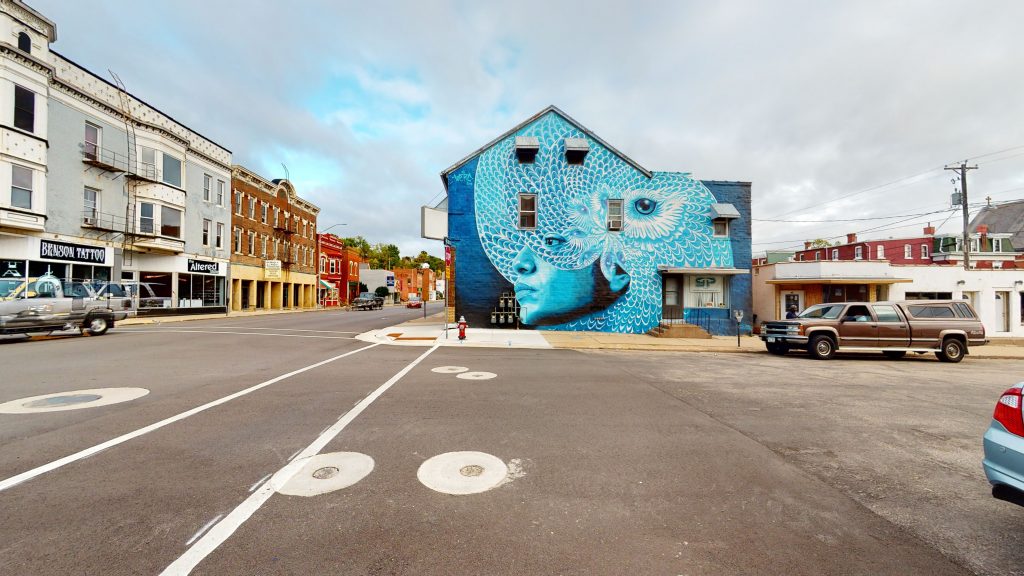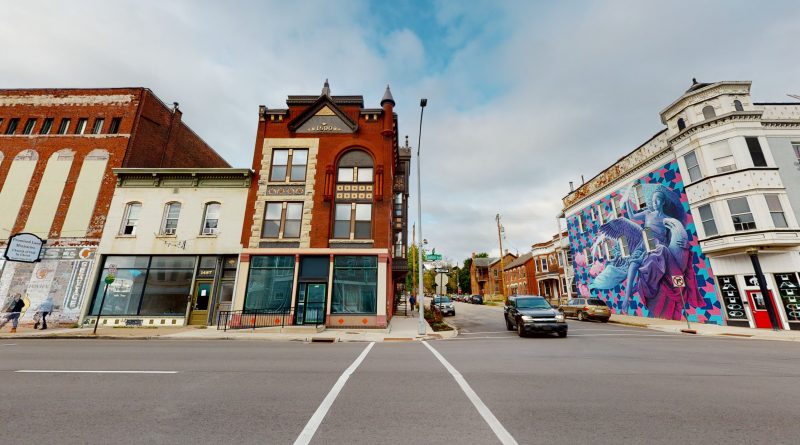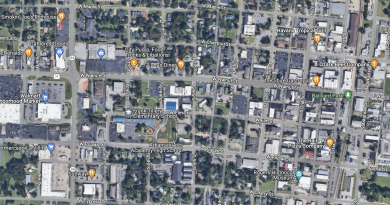Postcards from Dubuque: Then and Now
On the way to my day of Matterport imaging at Steeple Square in Dubuque, I stop at Habits Coffee & Mini Donut Co. in a basement on Locust. Dubuque used to be a fun stop for me when traveling between Midwestern destinations and origins. Monks was always a favorite. Habits is newer. They offer customizable mini-donuts, fresh-fried and finished while you wait. Midwestern ingenuity! Surprisingly decent coffee. Anyway, check out both spots next time you’re in town.
I had stayed the previous night at a Super 8 in Anamosa. Plans for a trip to Iowa City fell through, and I suppose it was for the best. You know, that whole COVID hotspot thing. I tend to like to change it up as far as accommodations when I’m traveling, and I’m not particularly picky. I’m cool with a futon in a basement (Robbinsdale, Minnesota). An affordable– though quite luxurious- B&B (near Minneapolis’ Loring Park). I even brought a tent and sleeping bag with me. If I don’t get bedbugs or, well, murdered, I’m good with pretty much anything. So, it’s always wild to me how these places get terrible reviews. It’s like, you’re paying $57 per night and you’re staying in a strip mall ten minutes outside Anamosa, Iowa. Like, what, pray tell, did you expect? I mean, really.
You even get Single Serving 100% Café Arabica for your mini coffee maker. In this economy! (‘This economy’ jokes? In this economy?)
Suffice it to say, the ubiquitous Gujarati Hotel Mafia delivered. My one complaint? Waking up pre-alarm to what sounded like hulking beasts stalking down the floors above me. The funny thing was, there were no floors above me. Such, I suppose, is the tendency in a stick-frame motel in BFE.
I stopped in Monticello for a drive down the town’s historic main street. I admired a Theisen’s, located on the main drag, its roof bedecked with photovoltaics. Iowa, the Saudi Arabia of wind– and solar?!
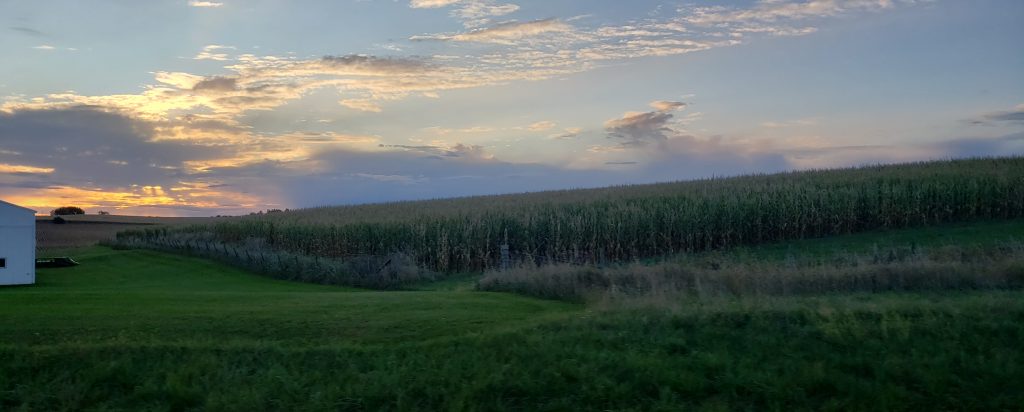
On To Dubuque
Dubuque is French for The Buque. No, I’m kidding, it was actually named for the Quebecois Julien Dubuque, who founded the white settlement there in 1785. The Quebecois voyageur/entrepreneur arrived in the area toward the end of the American Revolutionary War. Like neighboring Galena, twenty miles to the east, the hills held rich deposits of the eponymous ore, a.k.a. lead sulfide (PbS). Dubuque struck a deal with the local Meskwaki Indians and representatives of the Spanish government, which controlled what would then become the Louisiana Purchase, to secure mining rights. The city was chartered decades after Dubuque’s death in 1810– and named after him. The city went on to become an important port on the Mississippi River, which remains a vitally important waterway for bulk trade.
Galena the ore is generally fairly worthless today, as we don’t really use lead for much other than making batteries. Or, well, bullets, I guess.
Galena the town, on the other hand, is a well-known tourist destination. It is on Main Street Cutesy par with Stillwater, Minnesota or Mackinac Island. On the gently winding main drag, you can buy artisanal olive oil and Wine-O’Clock-type paraphernalia, or find a half-decent meal. US President Ulysses S. Grant originated there. Tonawanda Seneca engineer and army officer Ely S. Parker, a.k.a. Hasanoanda, hung out in Galena, too, once upon a time, where he met Grant. (Parker would later go on to author the terms of the Confederate surrender at Appomattox– and would serve as Commissioner of Indian Affairs under Grant).
As for our man Julien (Dubuque), he struggled to compete in the late years of the fur trade into the 19th century. The Napoleonic Wars did a number on European-American trade demand. That, combined with increasingly extensive and violent encroachment of white settlers on native lands (and according depletion of natural resources and animal populations) more or less ended the fur trade. A piece of fanciful, turn-of-the-century marketing collateral in Dubuque called it a magnificent city of seven hills, just like Rome. The Paris of the Upper Mississippi? I mean. The hills are pretty dramatic, perhaps a third behind Cincinnati and Cincinnati a distant second to Pittsburgh. Considering the point about marketing of place is valuable. Economic development professionals today still make, well, extravagant claims to try and attract investment interest.
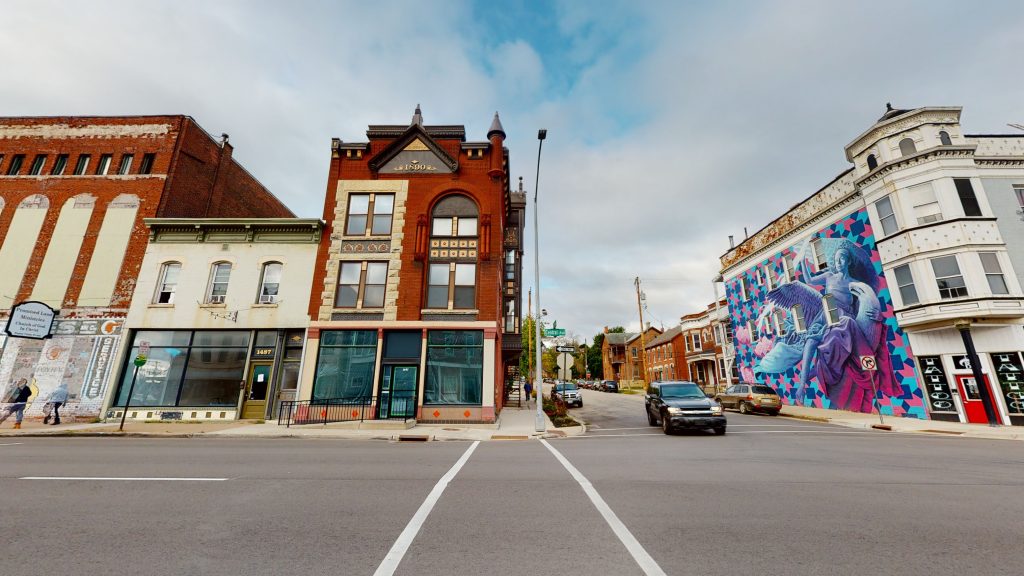
The Land, Before
Happy Indigenous People’s Day. I often find myself thinking about the history of names and places. I especially find myself noting the irony of having places named after people killed by white settlers long ago. In this sense, we retain a bit of culture. It isn’t complete or intentional erasure, as it often is when sundry historians– evidenced by the right-wing fury over the likes of the 1619 project- gloss over the ugly parts of our history. It is, however, erasure when we disregard the history of place and the people who were there before. I learned a pretty balanced and critical take on American history in high school. But in middle and elementary school, it was definitely a lot more about the benevolent Wampanoag who helped the Englishmen with the funny hats while the former were getting their asses handed to them by their first New England winter, or whatever. Then they cuddled, did each other’s nails, and ate popcorn by the fire. And lived happily ever after. Right? But I digress.
Iowa was named after the Ioway tribe, which originally inhabited portions of what is now the state. As was often the case with white settlers who were too busy warring with one another and with local Indians to bother to develop cross-cultural competencies in diplomacy and trade, the very name Ioway was bungled– an exonym, I believe is the correct term.
Onto the age of Mr. Dubuque, The Sac and the Fox, as the federally recognized tribe is now known, were originally two distinct, separate tribes inhabiting parts of the Great Lakes region. The Sac and Fox languages, along with Kickapoo (Kiwikapawa), are part of the Algonquian language family. The Sac, or Sauk– transliterated from their own name for themselves, roughly othaakiwaki, first encountered French colonists in the 17th century. The Meskwaki came to be known as the Fox– owing to a mistranslation or mistransliteration by French colonists, whose exact nature is a bit unclear. A fox was used as a Meskwaki signature on the Great Peace of Montreal (La Grande paix de Montréal) of 1701. The Meskwaki fought a number of wars against French settlers along the St. Lawrence region until encroachment by white settlers drove them across the Great Lakes and eventually into Iowa.
The Iowa Legislature took the unusual step of selling the Meskwaki a large expanse of Iowa land in the 1850’s, well after Indian Removal Acts had violently expropriated tribes like the Meskwaki from the lands they had occupied at the time of encountering Mr. Dubuque, et alia. It’s not exactly unusual that These related languages and their respective tribes are now scattered across Iowa, Kansas, and Oklahoma, and the three distinct Sac and Fox tribal entities count several thousands of members. There is still a Meskwaki settlement in Tama County, not terribly far away.
Dubuque, and Indigenous People’s Day
I originally meant to write this piece as a brief historical mention plus some travel writing about a place I had been. But I wanted to delve into the history specifically looking at the native and indigenous peoples involved because it’s important to understand the broad and contested contexts in which our cities were developed, and it’s important to not let Certain People claim that these contexts aren’t important. We can talk about it and we can even disagree about it, but we certainly can’t stay silent about it. It’s especially important when we are faced with bizarre cultural proclamations from people in power. Like one in particular from the White House today that is so abject that I need not even link to it. A vocal but powerful minority of our society claim things like that the antiracists are the real racists, or, as the White House just claimed, that “radicals” are imposing their “orthodoxy” by pointing out that Christopher Columbus was actually a motherfucker who happily enslaved people, gleefully raped native women, and murdered lots of people, for the glory of some distant monarch who was clearly appointed by a merciful God.
Pointing this out isn’t an attempt to rewrite history. It’s an attempt to suggest that there are always multiple narratives. Sometimes there are multiple truths. And sometimes those truths might even contradict one another. It’s possible that the founding of an individual city might not have directly involved specific bloodshed. Perhaps Julien Dubuque was not, like Christopher Columbus, a murderous rapist. Perhaps he was instead an honest businessman. Or perhaps he, like Abraham Lincoln, thought the Indian was a member of a race that had a “physical difference” from the white race, which “will probably forever forbid their living together on the footing of perfect inequality.” Or, perhaps he recognized that there were profound cultural, immunological, ideological, societal, technological, and other differences between white settlers and native peoples that played out in terms of violent conflict, but perhaps he wasn’t exactly rooting for the domination of one group over another because he recognized the value of human beings and human relationships.
Ascribing Intentionality When Intentionality Is Due
Or, you know, perhaps Dubuque was just a hustler, trying to make a quick buck and make a name for himself. In any case, he has a town named after him, and it ain’t a bad town, neither. The point is: You can honor something good that has come out of something bad, but you can’t sanitize the bad out of the good by conveniently ignoring it.
Bringing us full circle here: When I enjoyed my mini-donuts at Habit, I didn’t say a land acknowledgment before I ate them. That isn’t what the so-called “radicals” mentioned in the White House Decree were going for, either. No one is mad at me because I didn’t say a land acknowledgment before I ate my damn mini-donuts. Nor did I tell myself these mini-donuts were Part Of This Complete Breakfast. I acknowledged that they were a source of momentary enjoyment in a sad and broken world gone topsy-turvy. I noted that I would rectify this nutritional act of barbarity by spending the morning climbing up and down ladders in a church tower with a camera rig. I also noted that if I was going to tell a story about Dubuque, it would be one that would show a more complete picture, rather than some heroic and frankly ahistorical portrait of the enterprising white man building a legacy of industry and thrift. It would also be one that, as I will illustrate in my upcoming piece on Steeple Square, illustrates not only the past but also a potentially inclusive present and future. Contrary to what is suggested in the seething rancor of the White House statement, we don’t have to live under some cloud of self-imposed guilt over the past. But surely we can’t ignore it.
